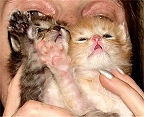City of Arlington Awarded Custody of 26,411 Reptiles, Insects, Arachnids, Crustaceans and Mammals
Wednesday, January 6, 2010
By: Jaklin Kaden
(DALLAS, TX); January 6, 2009--The City of Arlington was awarded custody of 26,411 animals--reptiles, insects, arachnids, crustaceans and mammals--seized from U.S. Global Exotics on Tuesday, December 15 under the authority of Arlington Animal Services at a hearing at the Arlington Municipal Courthouse.
Click here to download the ruling.
"The Respondents (Jasen and Vanessa Shaw) cruelly treated all of the animals made subject of this hearing by cruelly confining the animals. In particular, all of the animals were cruelly treated in one of more of the following manners: cruelly confined and injured due to such confinement; unreasonably denied necessary food and water, subjected for an extended period of time to food and/or water contaminated with foreign substances including but not limited to feces and urine…and denied necessary veterinary care," said Judge Michael Smith.
"Given that thousands of animals were clinically/subclinically sick on seizure, many will continue to suffer morbidity and mortality due to Global's abuse; veterinary treatment and other expert care can do only so much. My understanding is that Global was losing/throwing in the dumpster 500 animals--not all quite dead at the time--a day (which fits with the finding of 600 animals discovered sick/dead at the facility on the day of the seizure), and that makes 3,500 animals a week; we've certainly reduced that figure. Approximately 80% of Global’s animals were identified (by independent veterinary and other assessment) as sick and dying at seizure; whereas now approximately 80% (due to our care) are out of danger/healthy. Many of the 4,000 'listed dead since seizure' were necessarily euthanased on humane grounds; many showed truly pitiful suffering from starvation, dehydration, gross infectious disease including devastating radiating sores, partially cannibalised yet still living bodies, and many others in unsavable condition," said Dr. Clifford Warwick, one of the scientific specialists brought in to assist with the animal seizure, aftercare and testimony in court.
This case sheds light on a very dark industry that sells pets commonly sold at pet stores. Purchasers are often not aware of the horrific conditions in which these animals live. This industry is regulated, but that regulation has not prevented the suffering. Better enforcement of existing laws and regulations is critical to preventing animals from suffering this kind of abuse.
None of the animals will be available for adoption. The SPCA of Texas will place the animals with reputable organizations such as zoos and sanctuaries to ensure they do not go back into the pet trade business or are not released into the wild.
Four days before seizure, Arlington Animal Services asked the SPCA of Texas and the Humane Society of North Texas to assist with the transport and housing of these animals. This multi-agency partnership between the Arlington Animal Services, the SPCA of Texas and the Humane Society of North Texas was critical to ensuring the care of these animals until the final ruling made at the custody hearing.
Species-appropriate experts arrived from all over the world to direct the care of these animals that were seized in what is being called the largest animal rescue of exotic animals in a cruelty case ever in the United States. These experts were on hand during the seizure and while the animals are being housed.
The animals were removed from a business that specialized in shipping them to pet trade businesses globally. Hundreds of the animals were found dead, and thousands more were acutely suffering from severely overcrowded conditions, cruel confinement, lack of food and water and lack of appropriate care.
A pervasive smell of death permeated the U.S. Global’s building where the animals had been housed. Some animals, including Iguanas and turtles, had been left in packing crates without food, water or appropriate living conditions for unknown periods of time, possibly weeks. Other animals had begun to cannibalize each other, possibly due to severely overcrowded conditions and utter lack of food. Many animals may have been crushed to death by the weight of the hundreds of other animals piled on top of them in certain enclosures. In some cases, hundreds or even thousands of animals were forced to live in containers together to fight for what little food and water was available. Snakes and other reptiles were housed in areas that were far too cold while other animals were kept in individual containers so tiny that they could not move.
This massive effort has required a tremendous amount of effort, time and expense. The SPCA of Texas would like to thank the City of Arlington, the Humane Society of North Texas and the veterinarians and experts from around the world for their tremendous efforts on behalf of these animals.
"The sheer volume of animals in this seizure was unlike anything I've seen before in more than 30 years working in the animal welfare field," said James Bias, President of the SPCA of Texas. "Without the partnership between these groups, these animals would still be living in the horrific conditions they were removed from, and the loving care of the veterinarians and experts was critical to the animals' well-being."
.

